Land Law: Registration Act 2002 and Adverse Possession
VerifiedAdded on 2022/12/15
|10
|2967
|277
Essay
AI Summary
This essay provides an overview of land law, with a specific focus on the Land Registration Act 2002 and the concept of adverse possession. The introduction defines land law and its importance in protecting land rights, while the main body delves into the details of the Land Registration Act 2002, including its impact on e-conveyancing, and the principles governing land registration. The essay also explores adverse possession, examining its evolution, the role of the Land Registration Act 2002 in relation to it, and relevant case laws like Kingston v Thames Water Developments and J A Pye (Oxford) Ltd v Graham. The essay highlights the complexities of acquiring land through adverse possession and how the law has evolved to address it. The conclusion summarizes the key points and reinforces the significance of land registration in maintaining clear ownership and preventing disputes. The essay is based upon the Land Registration act 2002 and Land Registration act 1925.
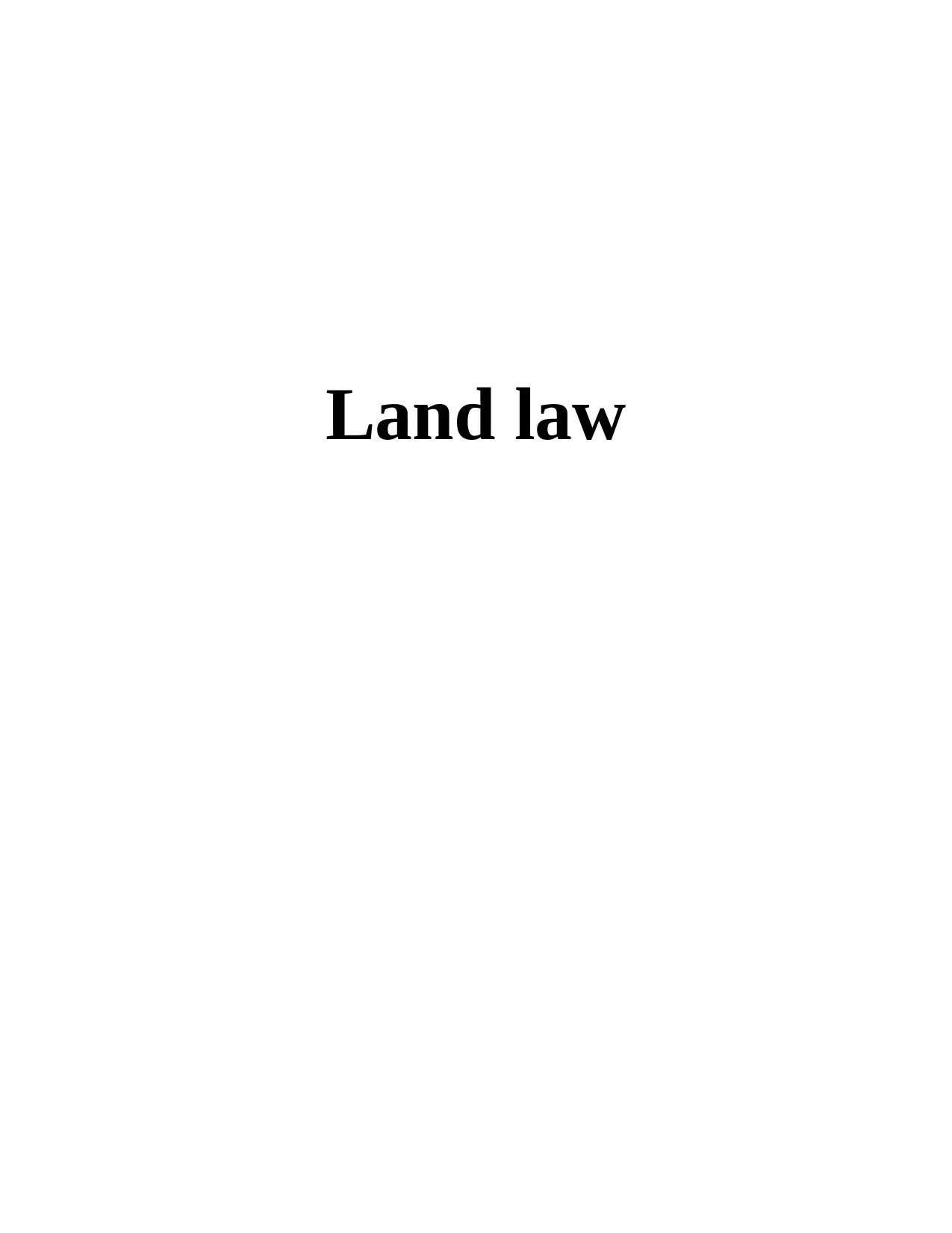
Land law
Paraphrase This Document
Need a fresh take? Get an instant paraphrase of this document with our AI Paraphraser
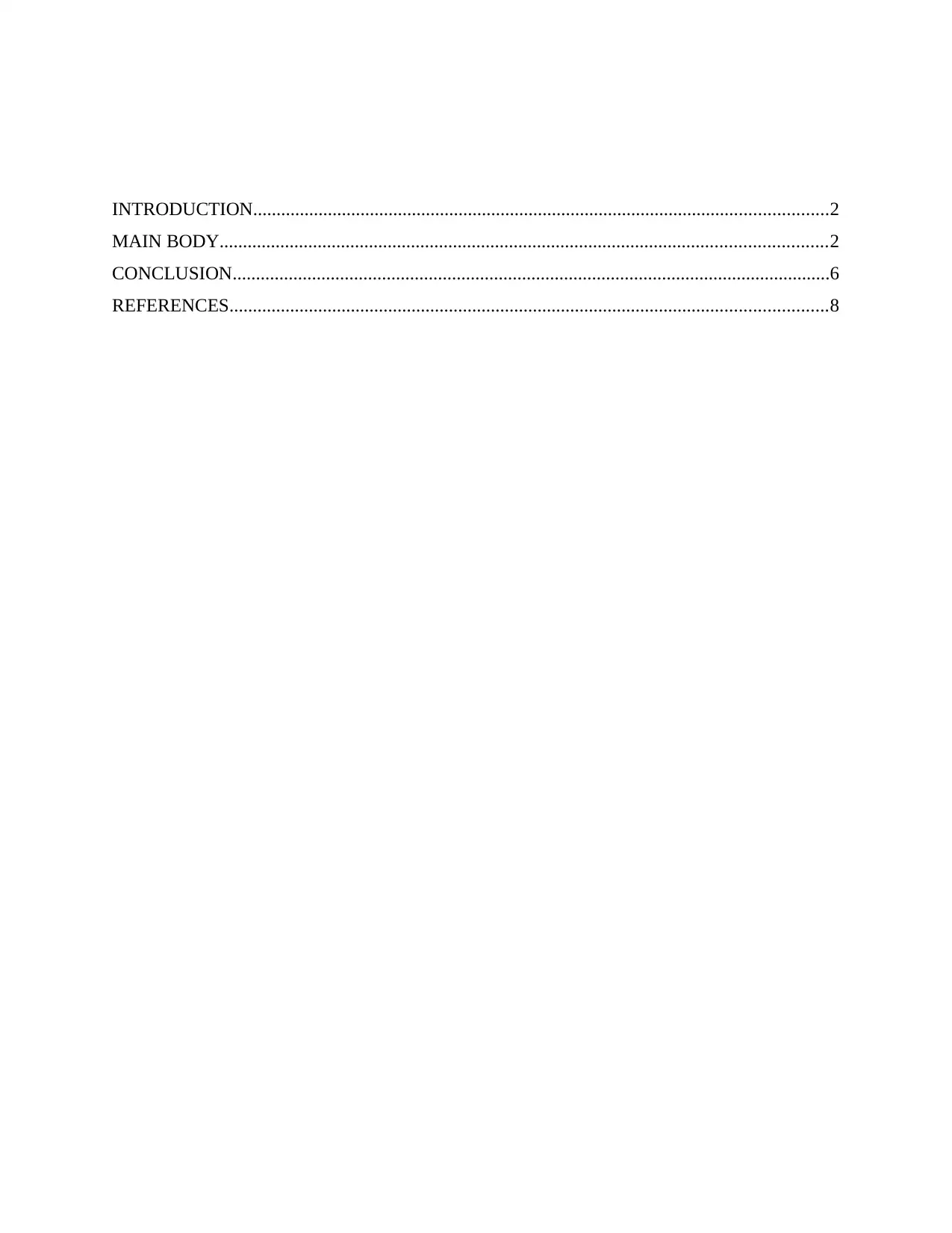
INTRODUCTION...........................................................................................................................2
MAIN BODY..................................................................................................................................2
CONCLUSION................................................................................................................................6
REFERENCES................................................................................................................................8
MAIN BODY..................................................................................................................................2
CONCLUSION................................................................................................................................6
REFERENCES................................................................................................................................8
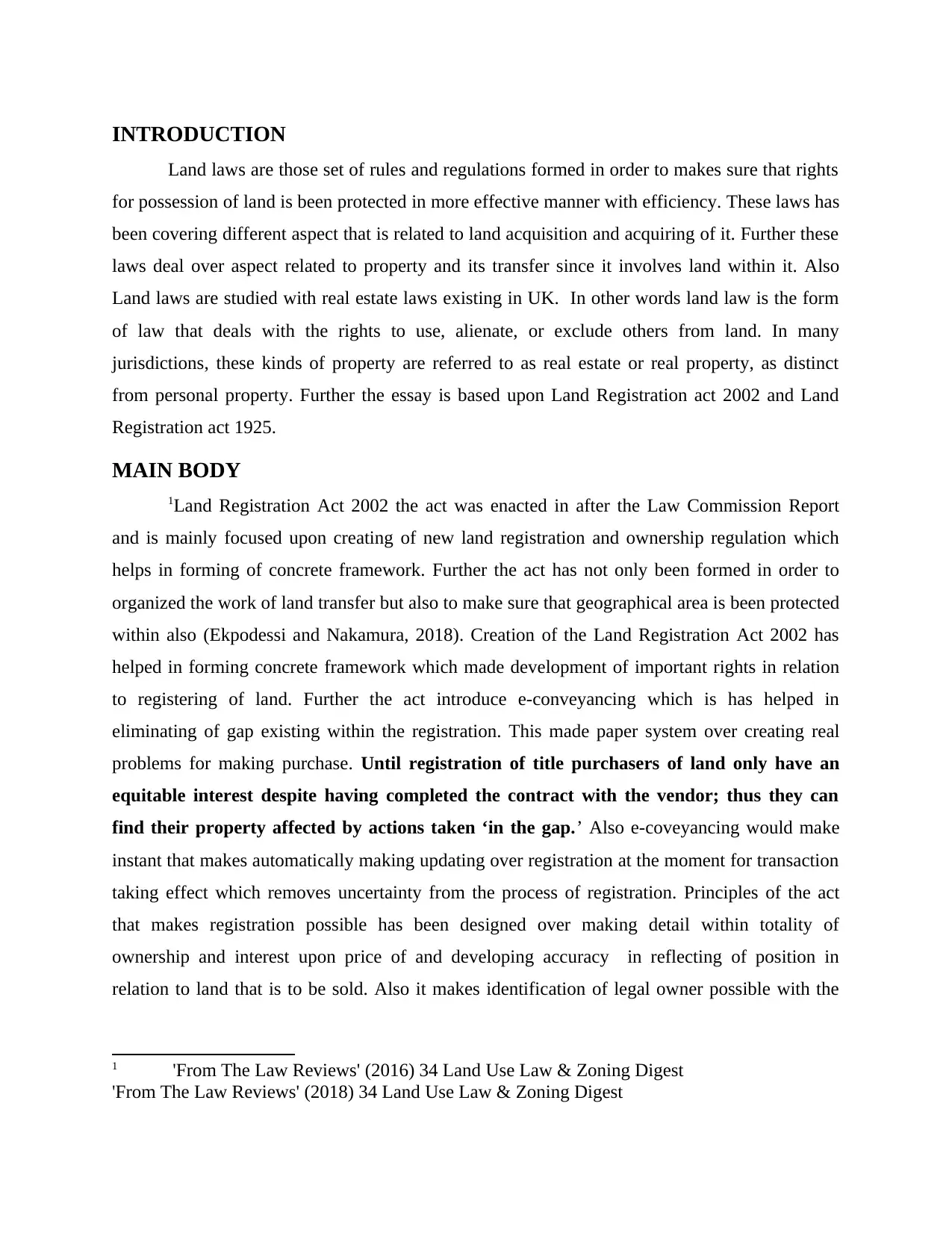
INTRODUCTION
Land laws are those set of rules and regulations formed in order to makes sure that rights
for possession of land is been protected in more effective manner with efficiency. These laws has
been covering different aspect that is related to land acquisition and acquiring of it. Further these
laws deal over aspect related to property and its transfer since it involves land within it. Also
Land laws are studied with real estate laws existing in UK. In other words land law is the form
of law that deals with the rights to use, alienate, or exclude others from land. In many
jurisdictions, these kinds of property are referred to as real estate or real property, as distinct
from personal property. Further the essay is based upon Land Registration act 2002 and Land
Registration act 1925.
MAIN BODY
1Land Registration Act 2002 the act was enacted in after the Law Commission Report
and is mainly focused upon creating of new land registration and ownership regulation which
helps in forming of concrete framework. Further the act has not only been formed in order to
organized the work of land transfer but also to make sure that geographical area is been protected
within also (Ekpodessi and Nakamura, 2018). Creation of the Land Registration Act 2002 has
helped in forming concrete framework which made development of important rights in relation
to registering of land. Further the act introduce e-conveyancing which is has helped in
eliminating of gap existing within the registration. This made paper system over creating real
problems for making purchase. Until registration of title purchasers of land only have an
equitable interest despite having completed the contract with the vendor; thus they can
find their property affected by actions taken ‘in the gap.’ Also e-coveyancing would make
instant that makes automatically making updating over registration at the moment for transaction
taking effect which removes uncertainty from the process of registration. Principles of the act
that makes registration possible has been designed over making detail within totality of
ownership and interest upon price of and developing accuracy in reflecting of position in
relation to land that is to be sold. Also it makes identification of legal owner possible with the
1 'From The Law Reviews' (2016) 34 Land Use Law & Zoning Digest
'From The Law Reviews' (2018) 34 Land Use Law & Zoning Digest
Land laws are those set of rules and regulations formed in order to makes sure that rights
for possession of land is been protected in more effective manner with efficiency. These laws has
been covering different aspect that is related to land acquisition and acquiring of it. Further these
laws deal over aspect related to property and its transfer since it involves land within it. Also
Land laws are studied with real estate laws existing in UK. In other words land law is the form
of law that deals with the rights to use, alienate, or exclude others from land. In many
jurisdictions, these kinds of property are referred to as real estate or real property, as distinct
from personal property. Further the essay is based upon Land Registration act 2002 and Land
Registration act 1925.
MAIN BODY
1Land Registration Act 2002 the act was enacted in after the Law Commission Report
and is mainly focused upon creating of new land registration and ownership regulation which
helps in forming of concrete framework. Further the act has not only been formed in order to
organized the work of land transfer but also to make sure that geographical area is been protected
within also (Ekpodessi and Nakamura, 2018). Creation of the Land Registration Act 2002 has
helped in forming concrete framework which made development of important rights in relation
to registering of land. Further the act introduce e-conveyancing which is has helped in
eliminating of gap existing within the registration. This made paper system over creating real
problems for making purchase. Until registration of title purchasers of land only have an
equitable interest despite having completed the contract with the vendor; thus they can
find their property affected by actions taken ‘in the gap.’ Also e-coveyancing would make
instant that makes automatically making updating over registration at the moment for transaction
taking effect which removes uncertainty from the process of registration. Principles of the act
that makes registration possible has been designed over making detail within totality of
ownership and interest upon price of and developing accuracy in reflecting of position in
relation to land that is to be sold. Also it makes identification of legal owner possible with the
1 'From The Law Reviews' (2016) 34 Land Use Law & Zoning Digest
'From The Law Reviews' (2018) 34 Land Use Law & Zoning Digest
⊘ This is a preview!⊘
Do you want full access?
Subscribe today to unlock all pages.

Trusted by 1+ million students worldwide
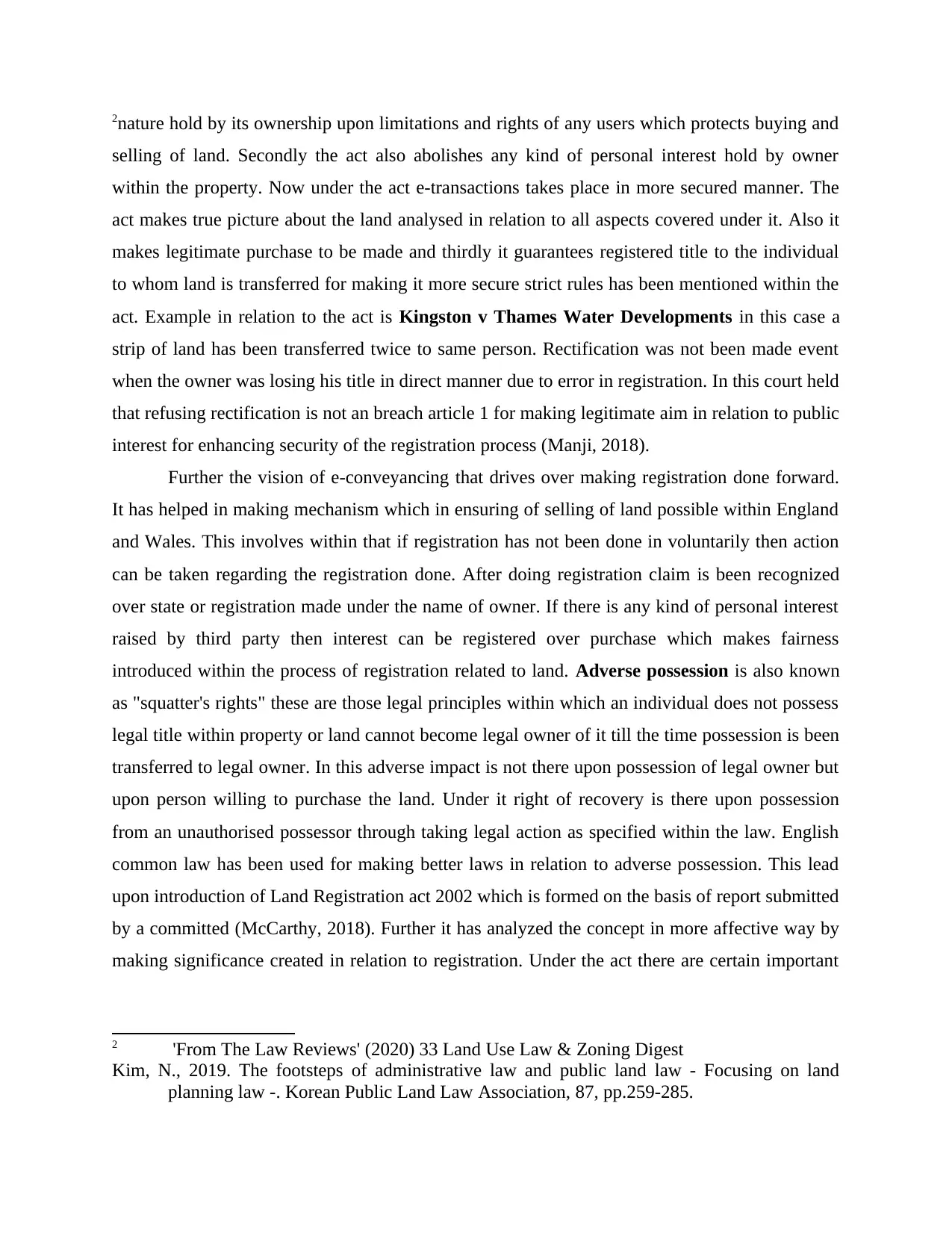
2nature hold by its ownership upon limitations and rights of any users which protects buying and
selling of land. Secondly the act also abolishes any kind of personal interest hold by owner
within the property. Now under the act e-transactions takes place in more secured manner. The
act makes true picture about the land analysed in relation to all aspects covered under it. Also it
makes legitimate purchase to be made and thirdly it guarantees registered title to the individual
to whom land is transferred for making it more secure strict rules has been mentioned within the
act. Example in relation to the act is Kingston v Thames Water Developments in this case a
strip of land has been transferred twice to same person. Rectification was not been made event
when the owner was losing his title in direct manner due to error in registration. In this court held
that refusing rectification is not an breach article 1 for making legitimate aim in relation to public
interest for enhancing security of the registration process (Manji, 2018).
Further the vision of e-conveyancing that drives over making registration done forward.
It has helped in making mechanism which in ensuring of selling of land possible within England
and Wales. This involves within that if registration has not been done in voluntarily then action
can be taken regarding the registration done. After doing registration claim is been recognized
over state or registration made under the name of owner. If there is any kind of personal interest
raised by third party then interest can be registered over purchase which makes fairness
introduced within the process of registration related to land. Adverse possession is also known
as "squatter's rights" these are those legal principles within which an individual does not possess
legal title within property or land cannot become legal owner of it till the time possession is been
transferred to legal owner. In this adverse impact is not there upon possession of legal owner but
upon person willing to purchase the land. Under it right of recovery is there upon possession
from an unauthorised possessor through taking legal action as specified within the law. English
common law has been used for making better laws in relation to adverse possession. This lead
upon introduction of Land Registration act 2002 which is formed on the basis of report submitted
by a committed (McCarthy, 2018). Further it has analyzed the concept in more affective way by
making significance created in relation to registration. Under the act there are certain important
2 'From The Law Reviews' (2020) 33 Land Use Law & Zoning Digest
Kim, N., 2019. The footsteps of administrative law and public land law - Focusing on land
planning law -. Korean Public Land Law Association, 87, pp.259-285.
selling of land. Secondly the act also abolishes any kind of personal interest hold by owner
within the property. Now under the act e-transactions takes place in more secured manner. The
act makes true picture about the land analysed in relation to all aspects covered under it. Also it
makes legitimate purchase to be made and thirdly it guarantees registered title to the individual
to whom land is transferred for making it more secure strict rules has been mentioned within the
act. Example in relation to the act is Kingston v Thames Water Developments in this case a
strip of land has been transferred twice to same person. Rectification was not been made event
when the owner was losing his title in direct manner due to error in registration. In this court held
that refusing rectification is not an breach article 1 for making legitimate aim in relation to public
interest for enhancing security of the registration process (Manji, 2018).
Further the vision of e-conveyancing that drives over making registration done forward.
It has helped in making mechanism which in ensuring of selling of land possible within England
and Wales. This involves within that if registration has not been done in voluntarily then action
can be taken regarding the registration done. After doing registration claim is been recognized
over state or registration made under the name of owner. If there is any kind of personal interest
raised by third party then interest can be registered over purchase which makes fairness
introduced within the process of registration related to land. Adverse possession is also known
as "squatter's rights" these are those legal principles within which an individual does not possess
legal title within property or land cannot become legal owner of it till the time possession is been
transferred to legal owner. In this adverse impact is not there upon possession of legal owner but
upon person willing to purchase the land. Under it right of recovery is there upon possession
from an unauthorised possessor through taking legal action as specified within the law. English
common law has been used for making better laws in relation to adverse possession. This lead
upon introduction of Land Registration act 2002 which is formed on the basis of report submitted
by a committed (McCarthy, 2018). Further it has analyzed the concept in more affective way by
making significance created in relation to registration. Under the act there are certain important
2 'From The Law Reviews' (2020) 33 Land Use Law & Zoning Digest
Kim, N., 2019. The footsteps of administrative law and public land law - Focusing on land
planning law -. Korean Public Land Law Association, 87, pp.259-285.
Paraphrase This Document
Need a fresh take? Get an instant paraphrase of this document with our AI Paraphraser
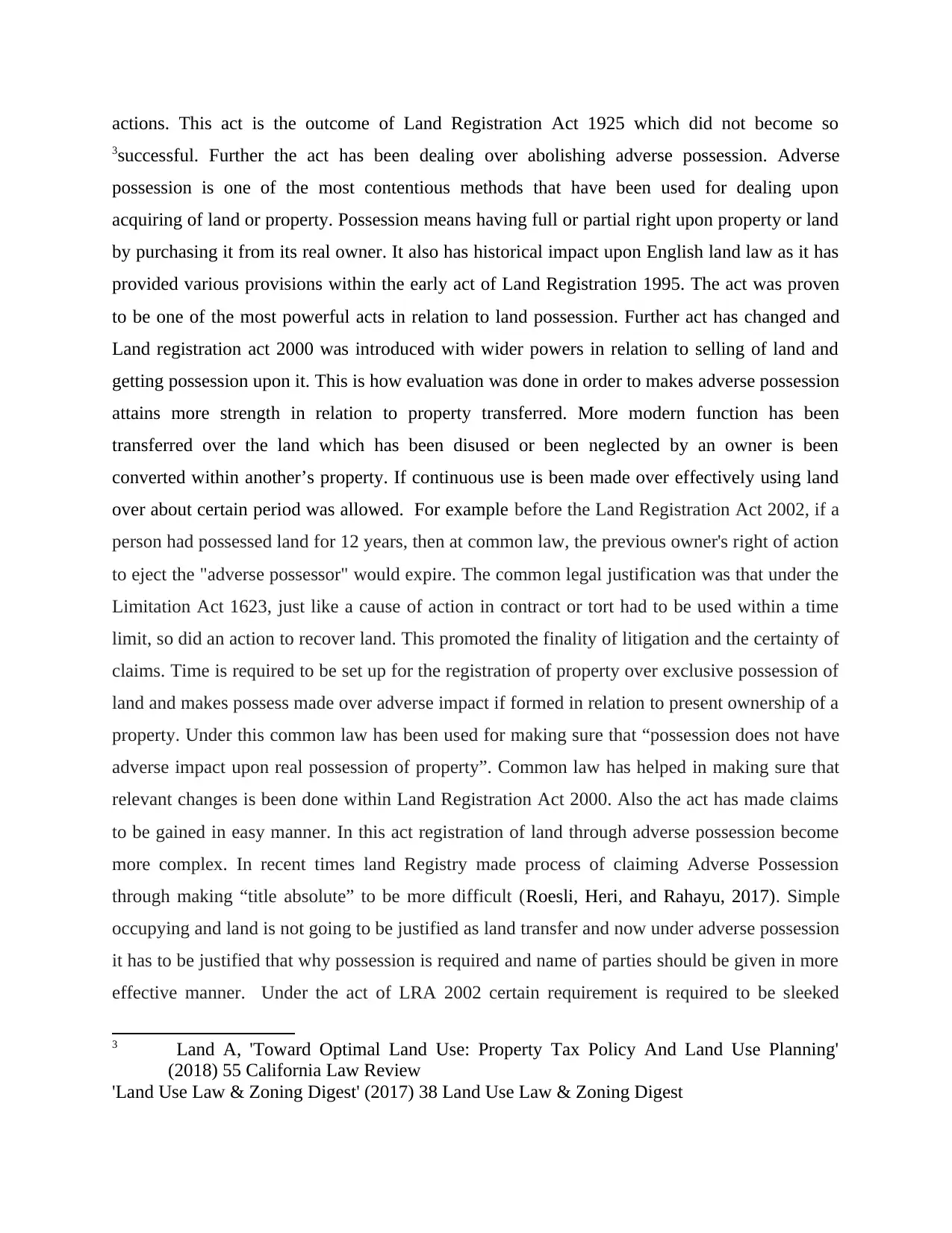
actions. This act is the outcome of Land Registration Act 1925 which did not become so
3successful. Further the act has been dealing over abolishing adverse possession. Adverse
possession is one of the most contentious methods that have been used for dealing upon
acquiring of land or property. Possession means having full or partial right upon property or land
by purchasing it from its real owner. It also has historical impact upon English land law as it has
provided various provisions within the early act of Land Registration 1995. The act was proven
to be one of the most powerful acts in relation to land possession. Further act has changed and
Land registration act 2000 was introduced with wider powers in relation to selling of land and
getting possession upon it. This is how evaluation was done in order to makes adverse possession
attains more strength in relation to property transferred. More modern function has been
transferred over the land which has been disused or been neglected by an owner is been
converted within another’s property. If continuous use is been made over effectively using land
over about certain period was allowed. For example before the Land Registration Act 2002, if a
person had possessed land for 12 years, then at common law, the previous owner's right of action
to eject the "adverse possessor" would expire. The common legal justification was that under the
Limitation Act 1623, just like a cause of action in contract or tort had to be used within a time
limit, so did an action to recover land. This promoted the finality of litigation and the certainty of
claims. Time is required to be set up for the registration of property over exclusive possession of
land and makes possess made over adverse impact if formed in relation to present ownership of a
property. Under this common law has been used for making sure that “possession does not have
adverse impact upon real possession of property”. Common law has helped in making sure that
relevant changes is been done within Land Registration Act 2000. Also the act has made claims
to be gained in easy manner. In this act registration of land through adverse possession become
more complex. In recent times land Registry made process of claiming Adverse Possession
through making “title absolute” to be more difficult (Roesli, Heri, and Rahayu, 2017). Simple
occupying and land is not going to be justified as land transfer and now under adverse possession
it has to be justified that why possession is required and name of parties should be given in more
effective manner. Under the act of LRA 2002 certain requirement is required to be sleeked
3 Land A, 'Toward Optimal Land Use: Property Tax Policy And Land Use Planning'
(2018) 55 California Law Review
'Land Use Law & Zoning Digest' (2017) 38 Land Use Law & Zoning Digest
3successful. Further the act has been dealing over abolishing adverse possession. Adverse
possession is one of the most contentious methods that have been used for dealing upon
acquiring of land or property. Possession means having full or partial right upon property or land
by purchasing it from its real owner. It also has historical impact upon English land law as it has
provided various provisions within the early act of Land Registration 1995. The act was proven
to be one of the most powerful acts in relation to land possession. Further act has changed and
Land registration act 2000 was introduced with wider powers in relation to selling of land and
getting possession upon it. This is how evaluation was done in order to makes adverse possession
attains more strength in relation to property transferred. More modern function has been
transferred over the land which has been disused or been neglected by an owner is been
converted within another’s property. If continuous use is been made over effectively using land
over about certain period was allowed. For example before the Land Registration Act 2002, if a
person had possessed land for 12 years, then at common law, the previous owner's right of action
to eject the "adverse possessor" would expire. The common legal justification was that under the
Limitation Act 1623, just like a cause of action in contract or tort had to be used within a time
limit, so did an action to recover land. This promoted the finality of litigation and the certainty of
claims. Time is required to be set up for the registration of property over exclusive possession of
land and makes possess made over adverse impact if formed in relation to present ownership of a
property. Under this common law has been used for making sure that “possession does not have
adverse impact upon real possession of property”. Common law has helped in making sure that
relevant changes is been done within Land Registration Act 2000. Also the act has made claims
to be gained in easy manner. In this act registration of land through adverse possession become
more complex. In recent times land Registry made process of claiming Adverse Possession
through making “title absolute” to be more difficult (Roesli, Heri, and Rahayu, 2017). Simple
occupying and land is not going to be justified as land transfer and now under adverse possession
it has to be justified that why possession is required and name of parties should be given in more
effective manner. Under the act of LRA 2002 certain requirement is required to be sleeked
3 Land A, 'Toward Optimal Land Use: Property Tax Policy And Land Use Planning'
(2018) 55 California Law Review
'Land Use Law & Zoning Digest' (2017) 38 Land Use Law & Zoning Digest
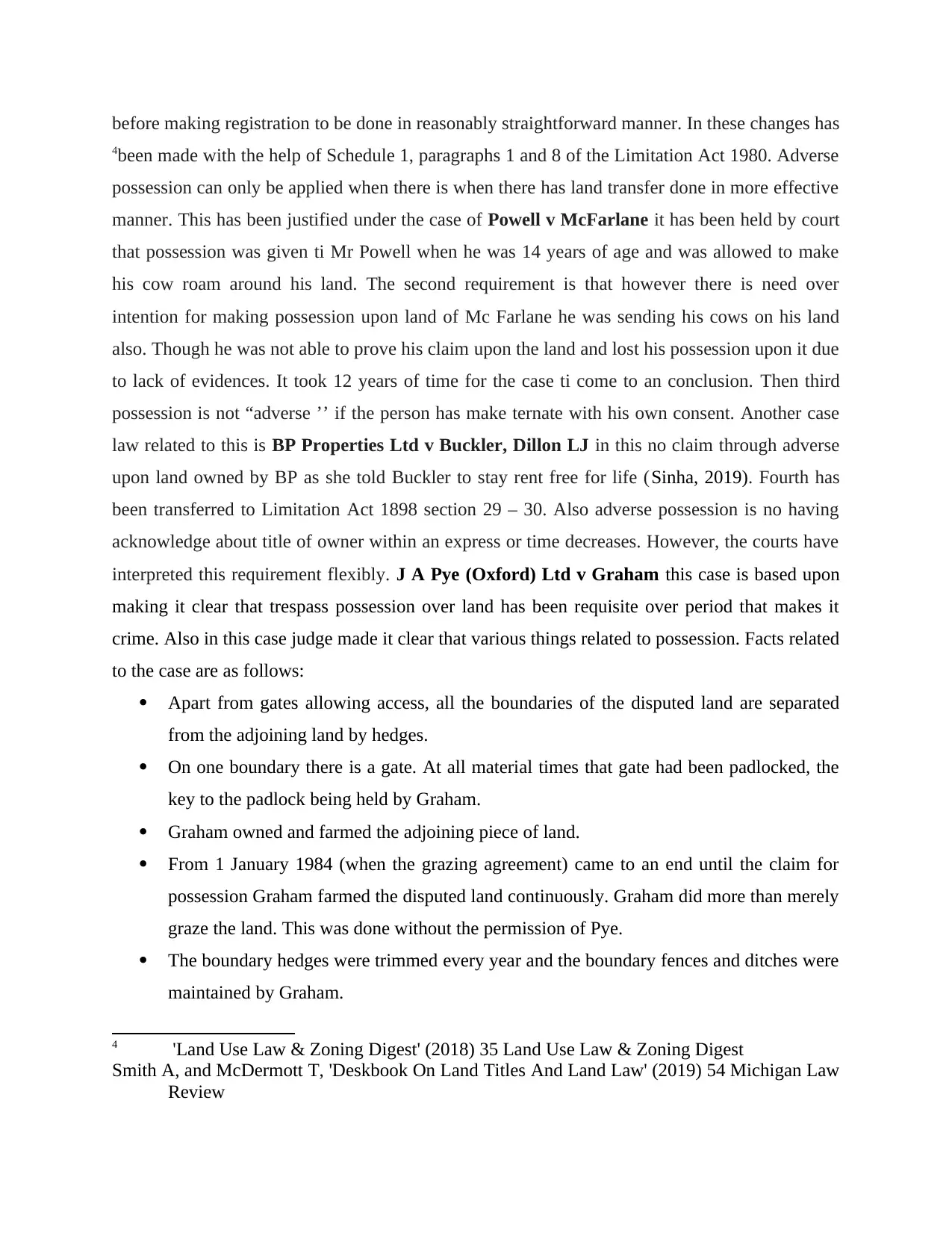
before making registration to be done in reasonably straightforward manner. In these changes has
4been made with the help of Schedule 1, paragraphs 1 and 8 of the Limitation Act 1980. Adverse
possession can only be applied when there is when there has land transfer done in more effective
manner. This has been justified under the case of Powell v McFarlane it has been held by court
that possession was given ti Mr Powell when he was 14 years of age and was allowed to make
his cow roam around his land. The second requirement is that however there is need over
intention for making possession upon land of Mc Farlane he was sending his cows on his land
also. Though he was not able to prove his claim upon the land and lost his possession upon it due
to lack of evidences. It took 12 years of time for the case ti come to an conclusion. Then third
possession is not “adverse ’’ if the person has make ternate with his own consent. Another case
law related to this is BP Properties Ltd v Buckler, Dillon LJ in this no claim through adverse
upon land owned by BP as she told Buckler to stay rent free for life (Sinha, 2019). Fourth has
been transferred to Limitation Act 1898 section 29 – 30. Also adverse possession is no having
acknowledge about title of owner within an express or time decreases. However, the courts have
interpreted this requirement flexibly. J A Pye (Oxford) Ltd v Graham this case is based upon
making it clear that trespass possession over land has been requisite over period that makes it
crime. Also in this case judge made it clear that various things related to possession. Facts related
to the case are as follows:
Apart from gates allowing access, all the boundaries of the disputed land are separated
from the adjoining land by hedges.
On one boundary there is a gate. At all material times that gate had been padlocked, the
key to the padlock being held by Graham.
Graham owned and farmed the adjoining piece of land.
From 1 January 1984 (when the grazing agreement) came to an end until the claim for
possession Graham farmed the disputed land continuously. Graham did more than merely
graze the land. This was done without the permission of Pye.
The boundary hedges were trimmed every year and the boundary fences and ditches were
maintained by Graham.
4 'Land Use Law & Zoning Digest' (2018) 35 Land Use Law & Zoning Digest
Smith A, and McDermott T, 'Deskbook On Land Titles And Land Law' (2019) 54 Michigan Law
Review
4been made with the help of Schedule 1, paragraphs 1 and 8 of the Limitation Act 1980. Adverse
possession can only be applied when there is when there has land transfer done in more effective
manner. This has been justified under the case of Powell v McFarlane it has been held by court
that possession was given ti Mr Powell when he was 14 years of age and was allowed to make
his cow roam around his land. The second requirement is that however there is need over
intention for making possession upon land of Mc Farlane he was sending his cows on his land
also. Though he was not able to prove his claim upon the land and lost his possession upon it due
to lack of evidences. It took 12 years of time for the case ti come to an conclusion. Then third
possession is not “adverse ’’ if the person has make ternate with his own consent. Another case
law related to this is BP Properties Ltd v Buckler, Dillon LJ in this no claim through adverse
upon land owned by BP as she told Buckler to stay rent free for life (Sinha, 2019). Fourth has
been transferred to Limitation Act 1898 section 29 – 30. Also adverse possession is no having
acknowledge about title of owner within an express or time decreases. However, the courts have
interpreted this requirement flexibly. J A Pye (Oxford) Ltd v Graham this case is based upon
making it clear that trespass possession over land has been requisite over period that makes it
crime. Also in this case judge made it clear that various things related to possession. Facts related
to the case are as follows:
Apart from gates allowing access, all the boundaries of the disputed land are separated
from the adjoining land by hedges.
On one boundary there is a gate. At all material times that gate had been padlocked, the
key to the padlock being held by Graham.
Graham owned and farmed the adjoining piece of land.
From 1 January 1984 (when the grazing agreement) came to an end until the claim for
possession Graham farmed the disputed land continuously. Graham did more than merely
graze the land. This was done without the permission of Pye.
The boundary hedges were trimmed every year and the boundary fences and ditches were
maintained by Graham.
4 'Land Use Law & Zoning Digest' (2018) 35 Land Use Law & Zoning Digest
Smith A, and McDermott T, 'Deskbook On Land Titles And Land Law' (2019) 54 Michigan Law
Review
⊘ This is a preview!⊘
Do you want full access?
Subscribe today to unlock all pages.

Trusted by 1+ million students worldwide
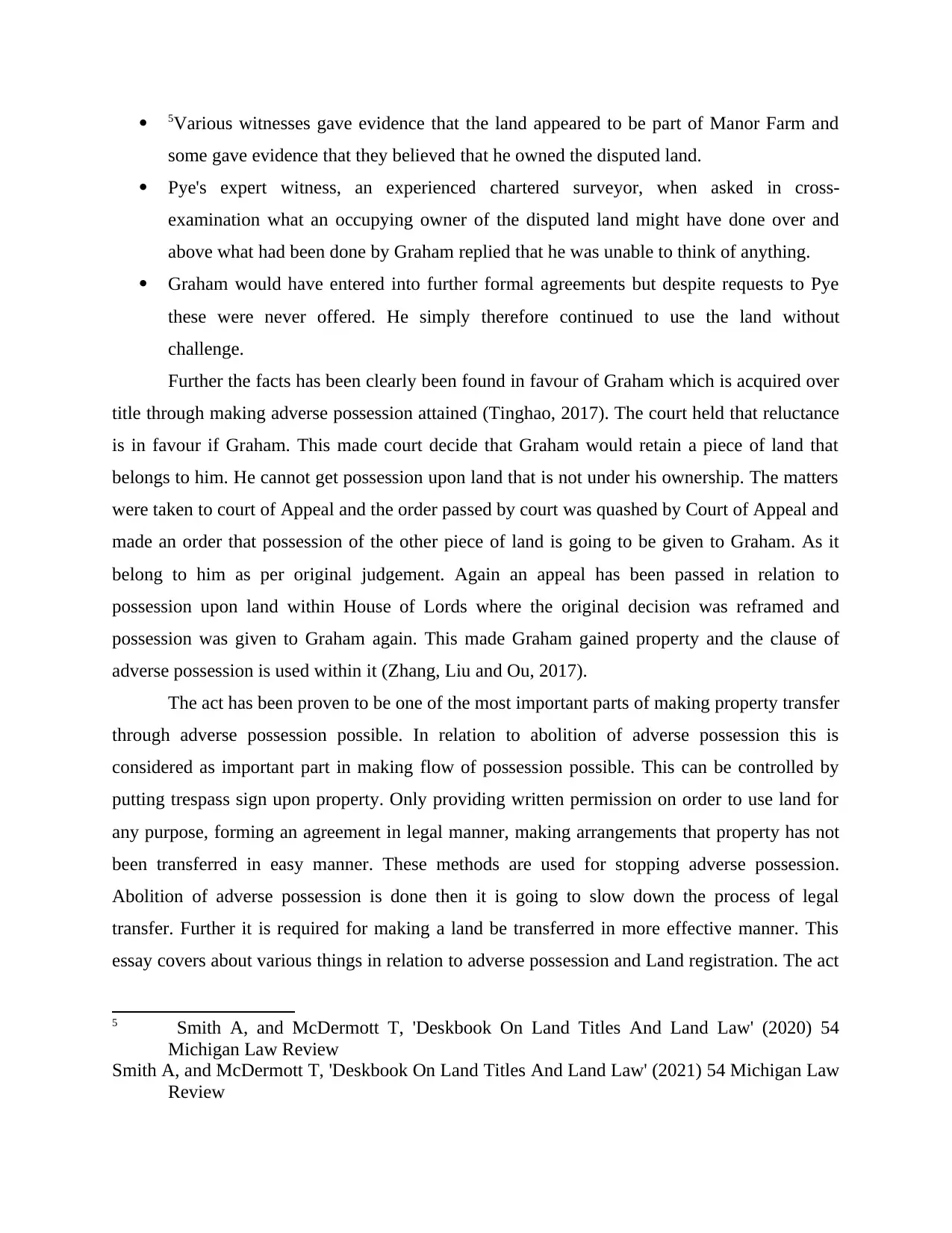
5Various witnesses gave evidence that the land appeared to be part of Manor Farm and
some gave evidence that they believed that he owned the disputed land.
Pye's expert witness, an experienced chartered surveyor, when asked in cross-
examination what an occupying owner of the disputed land might have done over and
above what had been done by Graham replied that he was unable to think of anything.
Graham would have entered into further formal agreements but despite requests to Pye
these were never offered. He simply therefore continued to use the land without
challenge.
Further the facts has been clearly been found in favour of Graham which is acquired over
title through making adverse possession attained (Tinghao, 2017). The court held that reluctance
is in favour if Graham. This made court decide that Graham would retain a piece of land that
belongs to him. He cannot get possession upon land that is not under his ownership. The matters
were taken to court of Appeal and the order passed by court was quashed by Court of Appeal and
made an order that possession of the other piece of land is going to be given to Graham. As it
belong to him as per original judgement. Again an appeal has been passed in relation to
possession upon land within House of Lords where the original decision was reframed and
possession was given to Graham again. This made Graham gained property and the clause of
adverse possession is used within it (Zhang, Liu and Ou, 2017).
The act has been proven to be one of the most important parts of making property transfer
through adverse possession possible. In relation to abolition of adverse possession this is
considered as important part in making flow of possession possible. This can be controlled by
putting trespass sign upon property. Only providing written permission on order to use land for
any purpose, forming an agreement in legal manner, making arrangements that property has not
been transferred in easy manner. These methods are used for stopping adverse possession.
Abolition of adverse possession is done then it is going to slow down the process of legal
transfer. Further it is required for making a land be transferred in more effective manner. This
essay covers about various things in relation to adverse possession and Land registration. The act
5 Smith A, and McDermott T, 'Deskbook On Land Titles And Land Law' (2020) 54
Michigan Law Review
Smith A, and McDermott T, 'Deskbook On Land Titles And Land Law' (2021) 54 Michigan Law
Review
some gave evidence that they believed that he owned the disputed land.
Pye's expert witness, an experienced chartered surveyor, when asked in cross-
examination what an occupying owner of the disputed land might have done over and
above what had been done by Graham replied that he was unable to think of anything.
Graham would have entered into further formal agreements but despite requests to Pye
these were never offered. He simply therefore continued to use the land without
challenge.
Further the facts has been clearly been found in favour of Graham which is acquired over
title through making adverse possession attained (Tinghao, 2017). The court held that reluctance
is in favour if Graham. This made court decide that Graham would retain a piece of land that
belongs to him. He cannot get possession upon land that is not under his ownership. The matters
were taken to court of Appeal and the order passed by court was quashed by Court of Appeal and
made an order that possession of the other piece of land is going to be given to Graham. As it
belong to him as per original judgement. Again an appeal has been passed in relation to
possession upon land within House of Lords where the original decision was reframed and
possession was given to Graham again. This made Graham gained property and the clause of
adverse possession is used within it (Zhang, Liu and Ou, 2017).
The act has been proven to be one of the most important parts of making property transfer
through adverse possession possible. In relation to abolition of adverse possession this is
considered as important part in making flow of possession possible. This can be controlled by
putting trespass sign upon property. Only providing written permission on order to use land for
any purpose, forming an agreement in legal manner, making arrangements that property has not
been transferred in easy manner. These methods are used for stopping adverse possession.
Abolition of adverse possession is done then it is going to slow down the process of legal
transfer. Further it is required for making a land be transferred in more effective manner. This
essay covers about various things in relation to adverse possession and Land registration. The act
5 Smith A, and McDermott T, 'Deskbook On Land Titles And Land Law' (2020) 54
Michigan Law Review
Smith A, and McDermott T, 'Deskbook On Land Titles And Land Law' (2021) 54 Michigan Law
Review
Paraphrase This Document
Need a fresh take? Get an instant paraphrase of this document with our AI Paraphraser
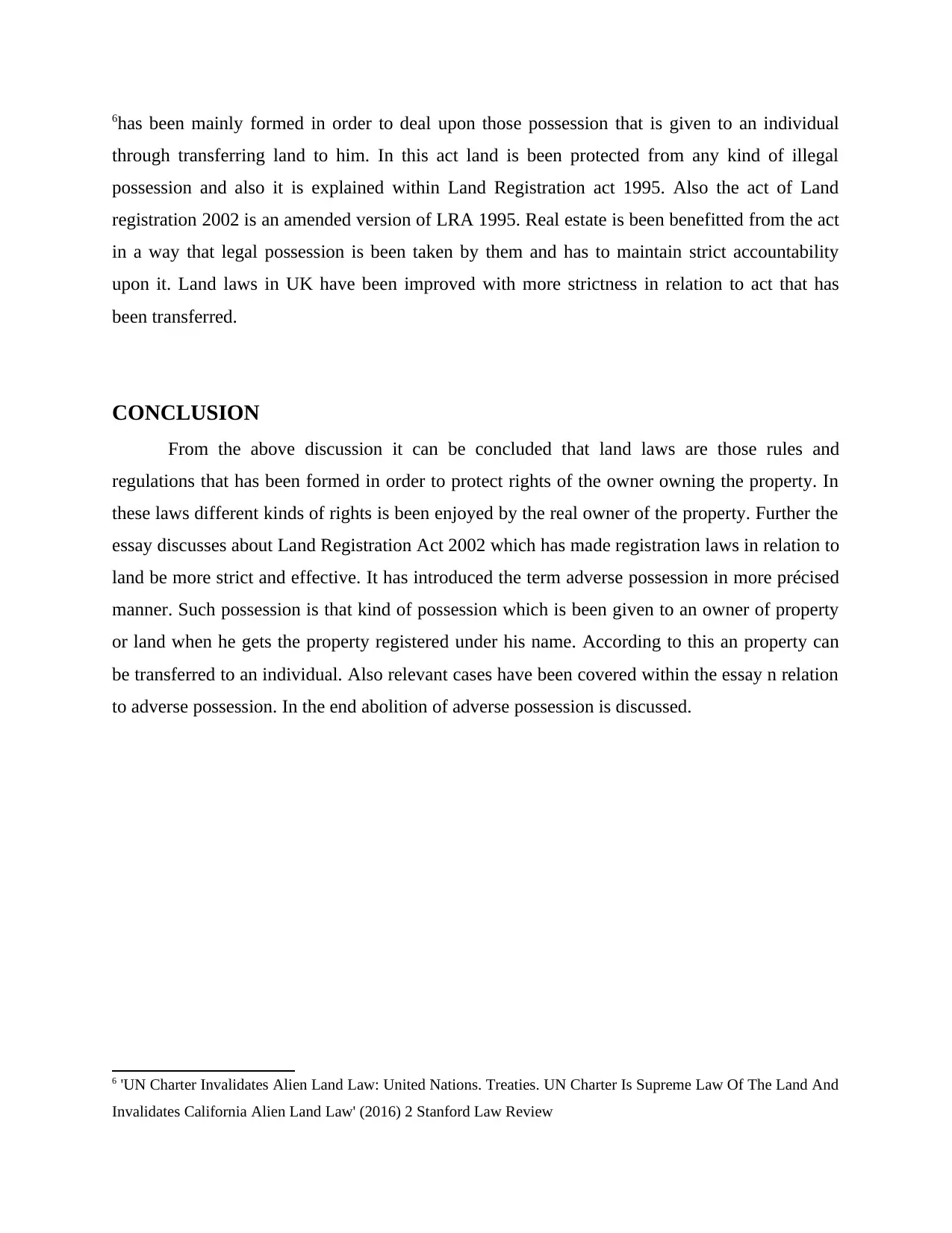
6has been mainly formed in order to deal upon those possession that is given to an individual
through transferring land to him. In this act land is been protected from any kind of illegal
possession and also it is explained within Land Registration act 1995. Also the act of Land
registration 2002 is an amended version of LRA 1995. Real estate is been benefitted from the act
in a way that legal possession is been taken by them and has to maintain strict accountability
upon it. Land laws in UK have been improved with more strictness in relation to act that has
been transferred.
CONCLUSION
From the above discussion it can be concluded that land laws are those rules and
regulations that has been formed in order to protect rights of the owner owning the property. In
these laws different kinds of rights is been enjoyed by the real owner of the property. Further the
essay discusses about Land Registration Act 2002 which has made registration laws in relation to
land be more strict and effective. It has introduced the term adverse possession in more précised
manner. Such possession is that kind of possession which is been given to an owner of property
or land when he gets the property registered under his name. According to this an property can
be transferred to an individual. Also relevant cases have been covered within the essay n relation
to adverse possession. In the end abolition of adverse possession is discussed.
6 'UN Charter Invalidates Alien Land Law: United Nations. Treaties. UN Charter Is Supreme Law Of The Land And
Invalidates California Alien Land Law' (2016) 2 Stanford Law Review
through transferring land to him. In this act land is been protected from any kind of illegal
possession and also it is explained within Land Registration act 1995. Also the act of Land
registration 2002 is an amended version of LRA 1995. Real estate is been benefitted from the act
in a way that legal possession is been taken by them and has to maintain strict accountability
upon it. Land laws in UK have been improved with more strictness in relation to act that has
been transferred.
CONCLUSION
From the above discussion it can be concluded that land laws are those rules and
regulations that has been formed in order to protect rights of the owner owning the property. In
these laws different kinds of rights is been enjoyed by the real owner of the property. Further the
essay discusses about Land Registration Act 2002 which has made registration laws in relation to
land be more strict and effective. It has introduced the term adverse possession in more précised
manner. Such possession is that kind of possession which is been given to an owner of property
or land when he gets the property registered under his name. According to this an property can
be transferred to an individual. Also relevant cases have been covered within the essay n relation
to adverse possession. In the end abolition of adverse possession is discussed.
6 'UN Charter Invalidates Alien Land Law: United Nations. Treaties. UN Charter Is Supreme Law Of The Land And
Invalidates California Alien Land Law' (2016) 2 Stanford Law Review
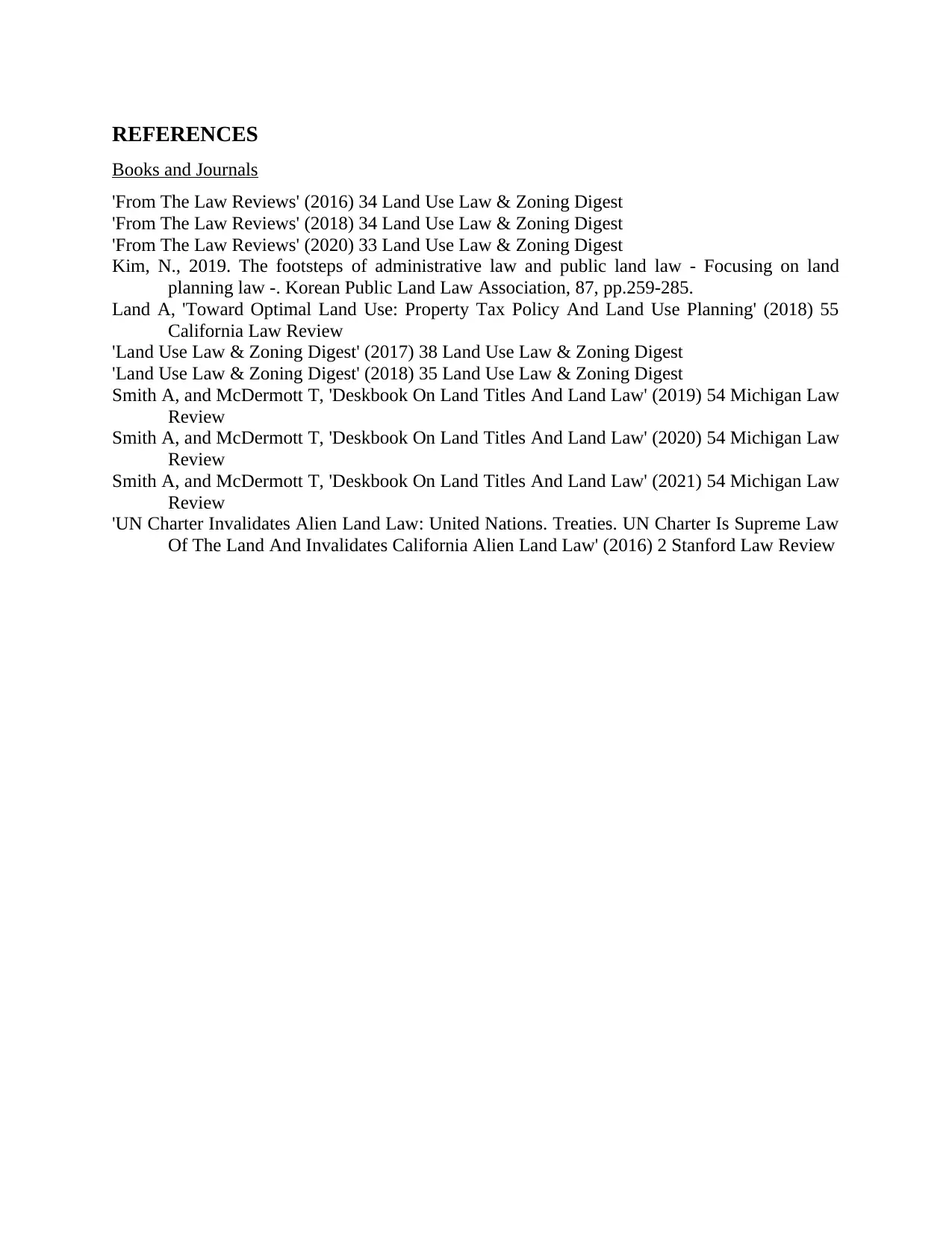
REFERENCES
Books and Journals
'From The Law Reviews' (2016) 34 Land Use Law & Zoning Digest
'From The Law Reviews' (2018) 34 Land Use Law & Zoning Digest
'From The Law Reviews' (2020) 33 Land Use Law & Zoning Digest
Kim, N., 2019. The footsteps of administrative law and public land law - Focusing on land
planning law -. Korean Public Land Law Association, 87, pp.259-285.
Land A, 'Toward Optimal Land Use: Property Tax Policy And Land Use Planning' (2018) 55
California Law Review
'Land Use Law & Zoning Digest' (2017) 38 Land Use Law & Zoning Digest
'Land Use Law & Zoning Digest' (2018) 35 Land Use Law & Zoning Digest
Smith A, and McDermott T, 'Deskbook On Land Titles And Land Law' (2019) 54 Michigan Law
Review
Smith A, and McDermott T, 'Deskbook On Land Titles And Land Law' (2020) 54 Michigan Law
Review
Smith A, and McDermott T, 'Deskbook On Land Titles And Land Law' (2021) 54 Michigan Law
Review
'UN Charter Invalidates Alien Land Law: United Nations. Treaties. UN Charter Is Supreme Law
Of The Land And Invalidates California Alien Land Law' (2016) 2 Stanford Law Review
Books and Journals
'From The Law Reviews' (2016) 34 Land Use Law & Zoning Digest
'From The Law Reviews' (2018) 34 Land Use Law & Zoning Digest
'From The Law Reviews' (2020) 33 Land Use Law & Zoning Digest
Kim, N., 2019. The footsteps of administrative law and public land law - Focusing on land
planning law -. Korean Public Land Law Association, 87, pp.259-285.
Land A, 'Toward Optimal Land Use: Property Tax Policy And Land Use Planning' (2018) 55
California Law Review
'Land Use Law & Zoning Digest' (2017) 38 Land Use Law & Zoning Digest
'Land Use Law & Zoning Digest' (2018) 35 Land Use Law & Zoning Digest
Smith A, and McDermott T, 'Deskbook On Land Titles And Land Law' (2019) 54 Michigan Law
Review
Smith A, and McDermott T, 'Deskbook On Land Titles And Land Law' (2020) 54 Michigan Law
Review
Smith A, and McDermott T, 'Deskbook On Land Titles And Land Law' (2021) 54 Michigan Law
Review
'UN Charter Invalidates Alien Land Law: United Nations. Treaties. UN Charter Is Supreme Law
Of The Land And Invalidates California Alien Land Law' (2016) 2 Stanford Law Review
⊘ This is a preview!⊘
Do you want full access?
Subscribe today to unlock all pages.

Trusted by 1+ million students worldwide

1 out of 10
Related Documents
Your All-in-One AI-Powered Toolkit for Academic Success.
+13062052269
info@desklib.com
Available 24*7 on WhatsApp / Email
![[object Object]](/_next/static/media/star-bottom.7253800d.svg)
Unlock your academic potential
Copyright © 2020–2026 A2Z Services. All Rights Reserved. Developed and managed by ZUCOL.





